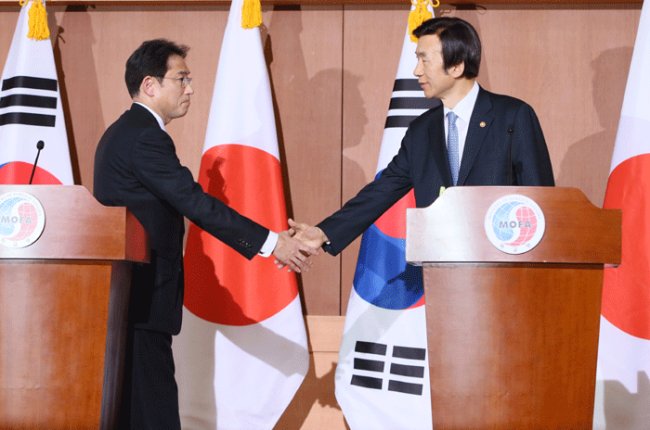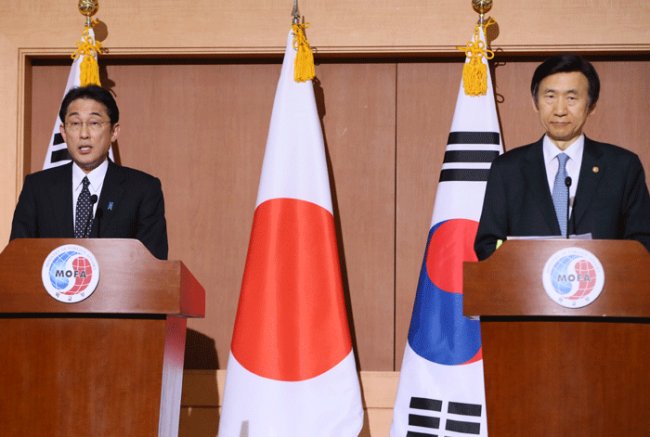Japan on Monday expressed its apology and contrition for its colonial-era sexual enslavement of Korean women, and agreed to provide 1 billion yen ($8.3 million) for a foundation to be established by South Korea to support the surviving victims.
The Tokyo government also said that it “felt strongly” about its responsibility for the issue “involving the Japanese military” that has been at the core of South Korea’s historical resentment toward its onetime colonizer — from 1910-45.
 |
| (Yonhap) |
The move came after Seoul’s Foreign Minister Yun Byung-se and his Japanese counterpart Fumio Kishida held talks in Seoul, settling one of the thorniest sticking points in their relations and paving the way for expanding bilateral cooperation.
“The comfort women issue is one involving the (Japanese) military that has left deep scars on the honor and dignity of many women. From this standpoint, the Japanese government feels strongly about its responsibility,” Kishida told a press conference after his 70-minute talks with Yun. Comfort woman is a euphemism for former sex slaves.
Kishida also affirmed that on the premise that Japan conscientiously carries out its end of the deal, the issue has been settled “finally and irrevocably” under Monday’s bilateral deal.
The contrition and apology was expressed in the name of Japanese Prime Minister Shinzo Abe. It is the first time that the nationalist Japanese leader apologized for the wartime misdeed in his name.
To establish the foundation for the victims, Tokyo would offer its monetary contribution from state coffers in a move that analysts say indicates that Japan tacitly recognizes its legal responsibility for the wartime misdeed.
The two sides said that the foundation would be formed to carry out a series of projects to “restore the honor and dignity of the victims, and heal the scars on their minds.”
Later in the day, President Park Geun-hye met with Kishida and stressed that Japan’s pledge should be “promptly and conscientiously” executed.
“I expect that the two countries will accept the outcome of the final negotiations meaningfully,” she said. “I hope that the bilateral relations would start anew through implementing the agreement conscientiously.”
Points of contention also remained, as the agreement failed to specify whether Japan was taking “legal” responsibility, with Kishida reportedly telling Japanese reporters that the agreed fund was not compensation but a project to help heal the wounds of the victims.
The two sides also remained ambiguous about Tokyo’s push to make Seoul relocate the statue of a girl representing comfort women erected near the Japanese Embassy here. While Kishida said he believed the statue would be moved “appropriately,” Yun said he would seek an “adequate solution through discussions with relevant organizations.”
 |
| (Yonhap) |
The agreement followed 12 rounds of bilateral director-general-level talks that had, until recently, been deadlocked as the two sides remained poles apart over how to settle the issue.
Japan had claimed the issue was already settled under a 1965 treaty normalizing bilateral ties. Article 2 of the treaty states the problem concerning property, rights and interests of the two parties and their nationals had been settled “completely and finally.”
But Seoul had claimed the issue was not on the agenda for the negotiations over the treaty at the time, given that it was only in the 1990s that victims started to raise the issue. It also claimed that it was a wartime human rights issue that should be dealt with separately.
So far, 238 South Korean victims have registered with the government. Of them, only 46 victims, including four living abroad, are still alive. Their average age is 89.
Some of the victims strongly protested the bilateral agreement, urging Tokyo to clearly take “legal responsibility” for its past misdeeds.
“We will ignore the agreement. We haven’t said yes (to the agreement) yet,” Lee Yong-soo, one of the victims said, stressing that what they had not fought for monetary compensation, but Japan’s recognition of its legal responsibility.
Political parties were torn in their evaluation of the bilateral agreement.
The ruling Saenuri Party noted the “considerable” progress in the bilateral negotiations, calling on Tokyo to implement follow-up measures to honor the agreement.
“We welcome the progress in the efforts to address the issue,” said Rep. Lee Jang-woo, the party’s spokesperson, in a statement. “It is a relief that the two sides could disentangle the tough bilateral issue.”
The main opposition Together Democratic Party criticized the agreement, claiming that it allowed Japan to shirk its legal responsibility for the wartime wrongdoing.
“It is very disappointing and regrettable,” said Rep. Kim Sung-soo, the party’s spokesperson.
Fresh momentum for negotiations arose earlier this month following a set of positive developments in the bilateral relations.
Last Wednesday, Korea’s Constitutional Court refused to review a petition over the constitutionality of the 1965 normalization treaty. On Dec. 17, a Seoul court cleared a Japanese reporter of defaming President Park by reporting rumors about her whereabouts during the deadly Sewol ferry disaster last year.
The two sides have strived to address the issue for more than two decades. Not all of the bilateral efforts had gone for naught.
Seoul secured the 1993 Kono Statement and 1995 Murayama Statement that expressed Tokyo’s apology for its wartime sexual enslavement of Asian women and its wartime aggression and colonization, respectively.
However, these statements were considered far from satisfactory, as the victims and South Korea’s civil society demanded Japan take “legal responsibilities” for the colonial-era misdeeds rather than taking steps based on humanitarian or moral grounds.
Amid growing international pressure to settle the issue, Japan set up a civilian fund, called the Asia Women’s Fund in 1995, for the former sex slaves from Korea, the Philippines, Taiwan, the Netherlands and Indonesia.
With the civilian fund, Japan offered 2 million yen each to 285 victims, including 61 South Koreans and 211 Filipinos. The Tokyo government also ran medical and welfare programs for the victims with money from state coffers.
But the fund to offer “solace money” to the victims was dissolved as the majority of Korean victims shunned the financial support, arguing that Japan once again attempted to shirk its legal responsibilities.
The Seoul government, for its part, has offered financial assistance to the victims since 1993, when an act to support their livelihoods was enacted.
Currently, each victim receives a monthly payment of 1.04 million won ($893.70), which will rise to 1.26 million won next year. The government offers another 757,000 won for medical fees, which will also increase to 1.05 million won next year.
By Song Sang-ho (sshluck@heraldcorp.com)

